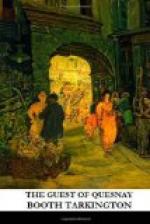“Don’t tell Mr. Saffren my name!”
“But I hadn’t meant to,” I protested.
“Don’t speak of me to him at all,” she said, with the same hurried eagerness. “Will you let me have my way?”
“Could there be any question of that?” I replied, and to my astonishment found that we had somehow impulsively taken each other’s hands, as upon a serious bargain struck between us.
CHAPTER XIII
The round moon was white and at its smallest, high overhead, when I stepped out of the phaeton in which Miss Elizabeth sent me back to Madame Brossard’s; midnight was twanging from a rusty old clock indoors as I crossed the fragrant courtyard to my pavilion; but a lamp still burned in the salon of the “Grande Suite,” a light to my mind more suggestive of the patient watcher than of the scholar at his tome.
When my own lamp was extinguished, I set my door ajar, moved my bed out from the wall to catch whatever breeze might stir, “composed myself for the night,” as it used to be written, and lay looking out upon the quiet garden where a thin white haze was rising. If, in taking this coign of vantage, I had any subtler purpose than to seek a draught against the warmth of the night, it did not fail of its reward, for just as I had begun to drowse, the gallery steps creaked as if beneath some immoderate weight, and the noble form of Keredec emerged upon my field of vision. From the absence of the sound of footsteps I supposed him to be either barefooted or in his stockings. His visible costume consisted of a sleeping jacket tucked into a pair of trousers, while his tousled hair and beard and generally tossed and rumpled look were those of a man who had been lying down temporarily.
I heard him sigh—like one sighing for sleep—as he went noiselessly across the garden and out through the archway to the road. At that I sat straight up in bed to stare—and well I might, for here was a miracle! He had lifted his arms above his head to stretch himself comfortably, and he walked upright and at ease, whereas when I had last seen him, the night before, he had been able to do little more than crawl, bent far over and leaning painfully upon his friend. Never man beheld a more astonishing recovery from a bad case of rheumatism!
After a long look down the road, he retraced his steps; and the moonlight, striking across his great forehead as he came, revealed the furrows ploughed there by an anxiety of which I guessed the cause. The creaking of the wooden stairs and gallery and the whine of an old door announced that he had returned to his vigil.
I had, perhaps, a quarter of an hour to consider this performance, when it was repeated; now, however, he only glanced out into the road, retreating hastily, and I saw that he was smiling, while the speed he maintained in returning to his quarters was remarkable for one so newly convalescent.




